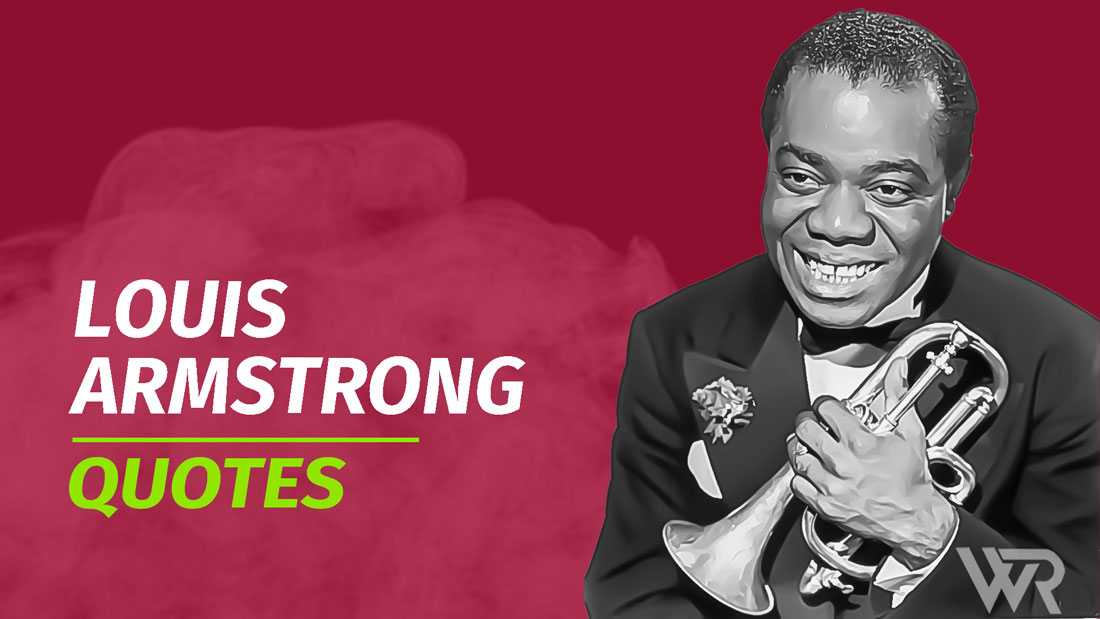Louis Armstrong, a legendary figure in the world of jazz, was not only renowned for his groundbreaking musical talent but also for his profound and often whimsical insights into life, music, and humanity.
Armstrong’s quotes are as enduring as his music, offering wisdom that transcends the boundaries of time and genre. His words reflect a deep understanding of the human experience, characterized by a blend of optimism, realism, and humor.
From reflections on the nature of jazz to observations about life’s complexities and simplicities, Armstrong’s quotations provide a window into the soul of a man who lived and breathed music.
Armstrong’s quotes are not just memorable phrases; they are expressions of a life richly lived and a testament to the power of music as a universal language.
Best Louis Armstrong Quotes
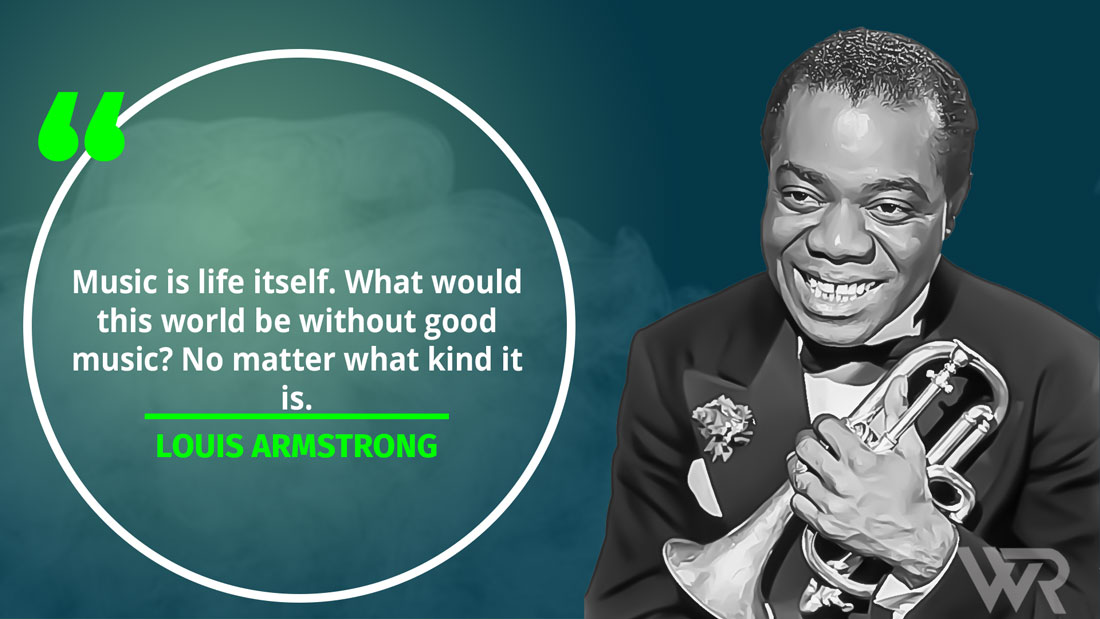
“Music is life itself. What would this world be without good music? No matter what kind it is.” – Louis Armstrong
Louis Armstrong’s words resonate with the idea that music transcends mere entertainment; it is an essential part of human existence. His perspective highlights the universality and necessity of music, reflecting its role in expressing emotions, connecting cultures, and providing solace.
Armstrong, a jazz legend, understood that regardless of genre, music has the power to enrich lives, bridge gaps, and convey what words alone cannot. His quote is a testament to music’s enduring influence on society and the human spirit.
Also Read: Che Guevara Quotes (with Commentary)
“We have to live today by what truth we can get today and be ready tomorrow to call it falsehood.” – Louis Armstrong
This quote from Louis Armstrong speaks to the fluidity of truth and the importance of adaptability. Armstrong, living through significant cultural and social changes, understood that what is considered true or relevant can rapidly change.
His words encourage embracing the present, understanding its context, and being prepared for future shifts. This approach to life and truth reflects a deep understanding of the nature of progress and the importance of remaining open-minded and flexible in the face of evolving realities.
“There is two kinds of music, the good, and the bad. I play the good kind.” – Louis Armstrong
Louis Armstrong’s simplistic view of music underscores a broader philosophy: the importance of quality and authenticity over complexity.
His distinction between good and bad music transcends genres and technicalities, focusing instead on the emotional and artistic integrity of the work. Armstrong, known for his soulful and heartfelt performances, exemplifies this belief in his music.
“Music is life itself. What would this world be without good music? No matter what kind it is.” – Louis Armstrong
Louis Armstrong’s words resonate with the idea that music transcends mere entertainment; it is an essential part of human existence. His perspective highlights the universality and necessity of music, reflecting its role in expressing emotions, connecting cultures, and providing solace.
Armstrong, a jazz legend, understood that regardless of genre, music has the power to enrich lives, bridge gaps, and convey what words alone cannot. His quote is a testament to music’s enduring influence on society and the human spirit.
“We have to live today by what truth we can get today and be ready tomorrow to call it falsehood.” – Louis Armstrong
This quote from Louis Armstrong speaks to the fluidity of truth and the importance of adaptability. Armstrong, living through significant cultural and social changes, understood that what is considered true or relevant can rapidly change.
His words encourage embracing the present, understanding its context, and being prepared for future shifts. This approach to life and truth reflects a deep understanding of the nature of progress and the importance of remaining open-minded and flexible in the face of evolving realities.
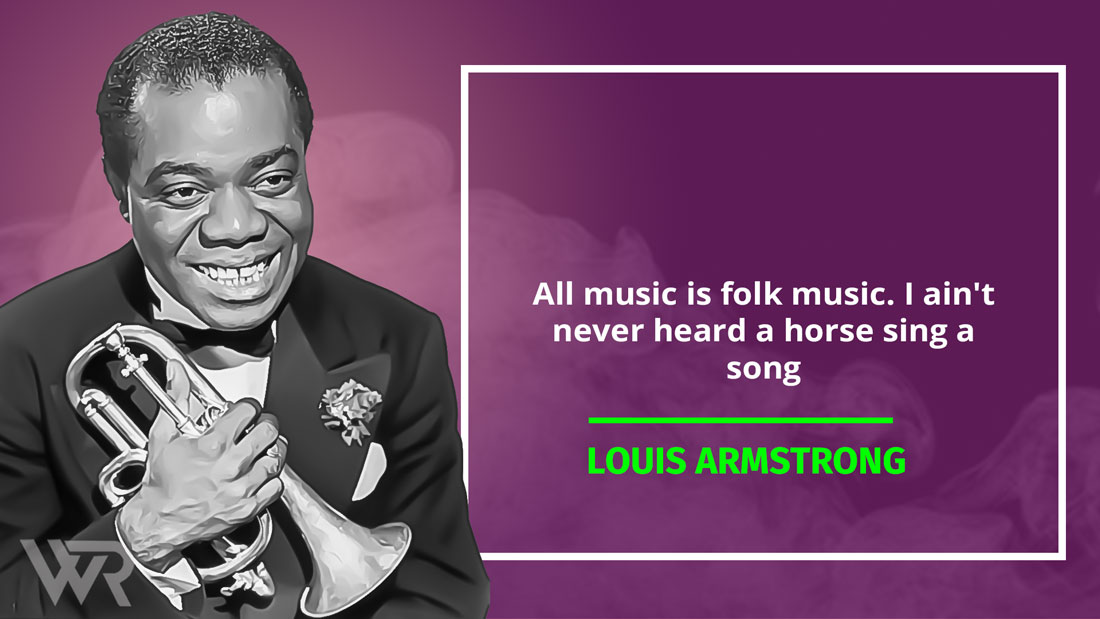
“All music is folk music. I ain’t never heard a horse sing a song.” – Louis Armstrong
In this humorous yet profound statement, Louis Armstrong captures the essence of art as a uniquely human expression. By labeling all music as “folk music,” he implies that music, regardless of its genre, originates from human experiences and emotions.
Armstrong’s quip about horses not singing highlights the distinctiveness of human creativity. His perspective sheds light on the innate ability of humans to express themselves artistically, reinforcing the idea that art is a fundamental aspect of human culture and identity.
“There is two kinds of music, the good, and the bad. I play the good kind.” – Louis Armstrong
Louis Armstrong’s simplistic view of music underscores a broader philosophy: the importance of quality and authenticity over complexity.
His distinction between good and bad music transcends genres and technicalities, focusing instead on the emotional and artistic integrity of the work. Armstrong, known for his soulful and heartfelt performances, exemplifies this belief in his music.
“The memory of things gone is important to a jazz musician.” – Louis Armstrong
Louis Armstrong’s reflection on the importance of memory in jazz underscores the genre’s deep connection to its roots and history. Jazz, known for its improvisational nature, relies on a musician’s ability to recall and reinvent past melodies and rhythms.
Armstrong’s quote highlights the significance of memory in shaping a musician’s style and creativity, emphasizing that even as artists innovate, they are profoundly influenced by the legacy of those who came before them.
“What we play is life.” – Louis Armstrong
This quote from Louis Armstrong succinctly captures the essence of his artistic philosophy. To Armstrong, jazz was not just a musical genre but a reflection of life’s complexities, joys, and sorrows.
His approach to music was deeply personal, mirroring the human experience in its rawest form. This perspective shaped his legendary status, as he was not only playing notes but also telling stories and expressing emotions through his music.
“Man, if you have to ask what jazz is, you’ll never know.” – Louis Armstrong
This quote reflects Armstrong’s belief that jazz is an experiential and instinctive art form, something that one feels rather than learns academically.
It speaks to the inherent complexity and subtlety of jazz, suggesting that its true essence lies beyond mere definition. Armstrong’s words imply that understanding jazz requires immersion and experience, not just intellectual inquiry.
“My whole life, my whole soul, my whole spirit is to blow that horn.” – Louis Armstrong
Louis Armstrong’s dedication to his craft is profoundly expressed in this quote. His horn was not just an instrument; it was an extension of his being, a channel for expressing his deepest emotions and experiences.
This quote epitomizes the dedication and passion that Armstrong, and many artists like him, have for their art – a commitment that goes beyond mere profession to become a core part of their identity.
“Jazz is played from the heart. You can even live by it. Always love it.” – Louis Armstrong
Here, Louis Armstrong conveys the heartfelt nature of jazz and its significance as a guiding force in life. He emphasizes that jazz is more than music; it’s a way of living, marked by passion and a deep emotional connection.
Armstrong’s words encourage an enduring love for jazz, suggesting that it offers not just musical enjoyment but also a profound life philosophy.
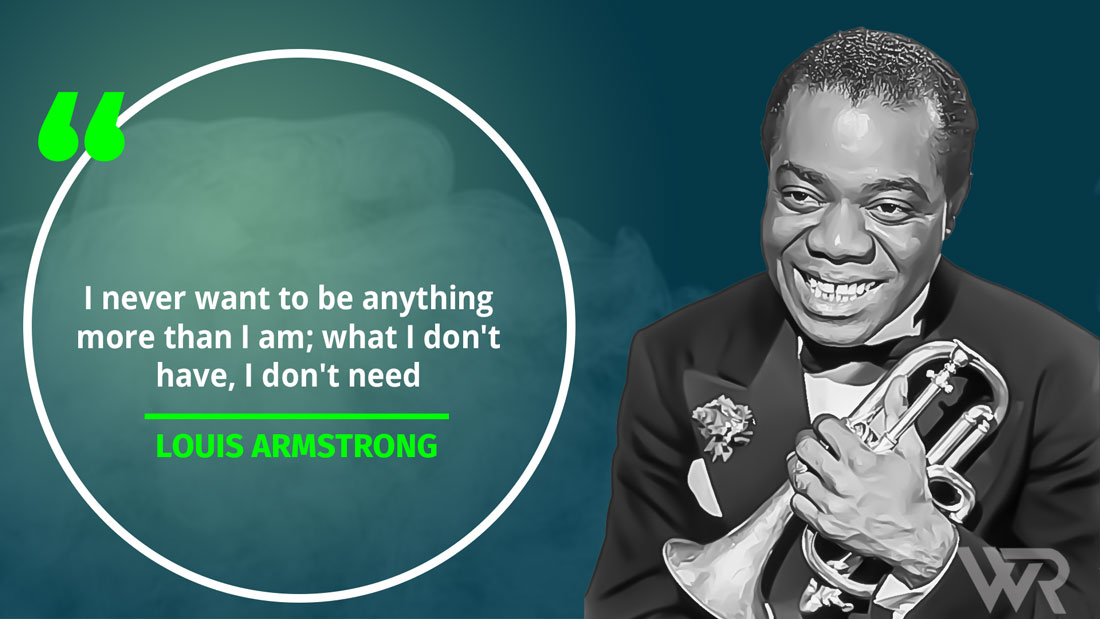
“I never want to be anything more than I am; what I don’t have, I don’t need.” – Louis Armstrong
This quote reflects Louis Armstrong’s contentment and self-assurance. It speaks to his belief in authenticity and being true to oneself.
Armstrong’s focus was not on accumulating fame or material possessions but on being genuine in his music and life. His approach highlights the importance of self-acceptance and the power of staying true to one’s roots and values.
“Musicians don’t retire; they stop when there’s no more music in them.” – Louis Armstrong
Louis Armstrong’s insight into the musician’s soul is profound. He suggests that music is not just a profession but a lifelong calling. The cessation of a musician’s career is not dictated by age or circumstance but by the exhaustion of their musical spirit.
This quote speaks to the enduring passion musicians have for their craft, a passion that lasts as long as the music within them does.
“I think I had a beautiful life. I didn’t wish for anything that I couldn’t get and I got pretty near everything I wanted because I worked for it.” – Louis Armstrong
In this reflective quote, Louis Armstrong expresses satisfaction with his life and career. His sense of fulfillment comes from his hard work and his ability to achieve his goals through perseverance.
Armstrong’s perspective offers an inspiring message about the value of dedication and the rewards of pursuing one’s passions with commitment and effort.
“Give me a kiss to build a dream on, and my imagination will thrive upon that kiss.” – Louis Armstrong
Louis Armstrong’s poetic expression captures the transformative power of a simple act of affection. This quote reflects his belief in the boundless potential of imagination, sparked by even the smallest gestures of love or inspiration.
Armstrong’s words resonate with anyone who finds deep meaning in small moments, suggesting that our dreams and creativity often find their roots in the most mundane aspects of life. It’s a reminder of the beauty and power inherent in the every day, and how these moments can fuel our artistic and personal journeys.
“All we got to do is just be friends, and kind of understand each other.” – Louis Armstrong
In this quote, Armstrong distills the essence of human connection and harmony into a simple yet profound truth. His words advocate for friendship and mutual understanding as fundamental to peaceful coexistence.
This perspective is timeless and especially relevant in a world often divided by differences. Armstrong’s insight underscores the idea that empathy and friendship can bridge gaps, fostering a sense of unity and compassion among people.
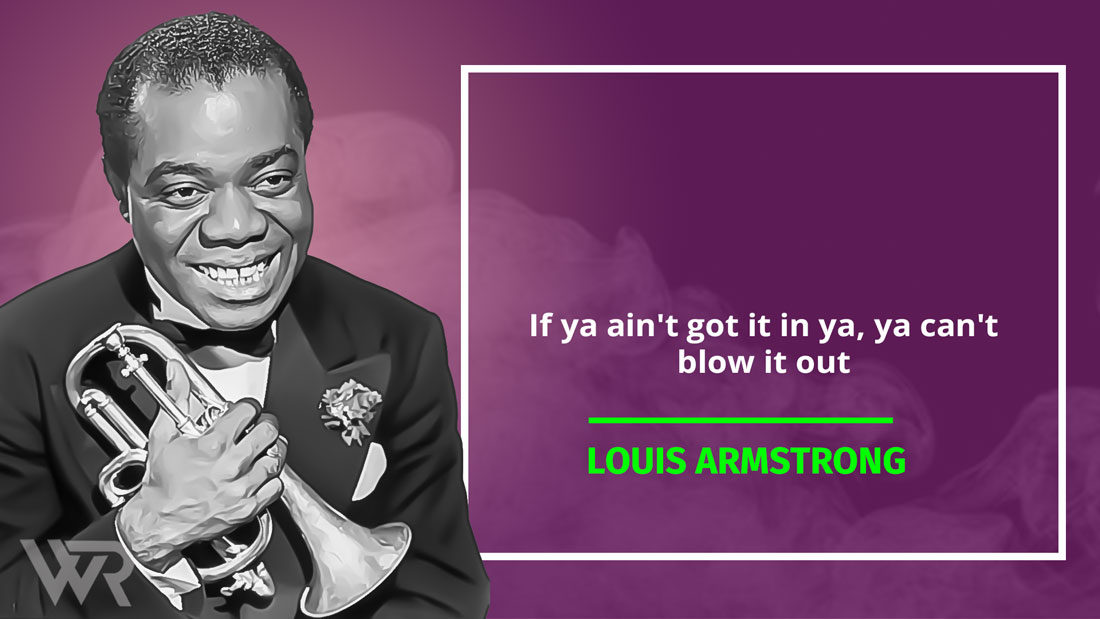
“If ya ain’t got it in ya, ya can’t blow it out.” – Louis Armstrong
Armstrong’s quote is a testament to authenticity in artistic expression. He implies that genuine art cannot be forced or fabricated; it must come from within. This speaks volumes about his approach to music: that true expression in art requires a deep, internal wellspring of emotion or experience.
Armstrong’s words encourage artists to cultivate their inner selves, as the art they produce is a reflection of their innermost thoughts and feelings.
“I think to myself, what a wonderful world.” – Louis Armstrong
These iconic words from Armstrong’s famous song convey a sense of optimism and appreciation for the world’s beauty.
Despite the challenges and sorrows that life may bring, Armstrong’s lyrics remind us to acknowledge and cherish the wonder and joy present in the world. This outlook is a powerful antidote to cynicism and despair, encouraging a mindset of gratitude and positivity.
“Some of you young folks been saying to me, ‘Hey Pops, what you mean ‘What a wonderful world’? How about all them wars all over the place, you call them wonderful?’ And I say, ‘How about listening to old Pops for a minute. Seems to me it ain’t the world that’s so bad but what we’re doing to it.'” – Louis Armstrong
In this reflective statement, Armstrong addresses the cynicism of the younger generation, acknowledging global conflicts while also pointing out that the world’s beauty and wonder are overshadowed by human actions.
His words encourage a shift in perspective, urging individuals to focus on the positive aspects of the world and our potential to bring about change. Armstrong’s message is one of hope and responsibility, emphasizing the power each person has to make the world a better place.
“The brick walls are there for a reason. The brick walls are not there to keep us out. The brick walls are there to give us a chance to show how badly we want something.” – Louis Armstrong
Armstrong’s metaphor of brick walls serves as a powerful symbol for the obstacles and challenges faced in life. He reframes these difficulties as opportunities for determination and perseverance to shine through.
His perspective teaches resilience and the importance of pursuing goals with passion and tenacity, seeing barriers not as impediments, but as tests of how much we value our dreams.
“I’m here in the cause of happiness.” – Louis Armstrong
This simple yet profound statement reflects Armstrong’s mission in life: to spread joy through his music and presence. It highlights his understanding of his role as not just a musician but a purveyor of happiness.
His approach to life and art was centered around the creation and sharing of joy, a reminder of the transformative power of a positive outlook and the importance of striving to make others happy.
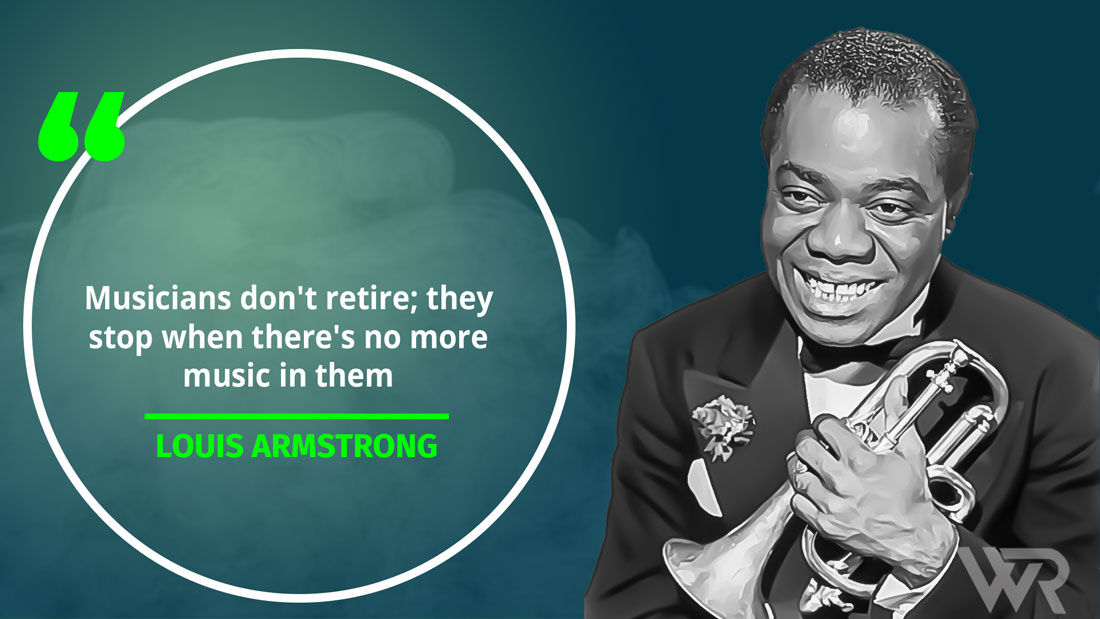
“Musicians don’t retire; they stop when there’s no more music in them.” – Louis Armstrong
In this insightful remark, Armstrong speaks to the lifelong journey of a musician. He suggests that a true musician’s career is not defined by age or external circumstances but by an internal wellspring of creativity and passion.
When the music inside them ceases, so does their journey as artists. This perspective highlights the deep connection musicians have with their art, viewing it as an integral part of their being rather than just a profession.
“It really puzzles me to see marijuana connected with narcotics… dope and all that crap. It’s a thousand times better than whiskey – it’s an assistant – a friend.” – Louis Armstrong
In this controversial quote, Armstrong expresses his unconventional view on marijuana, contrasting it with alcohol.
His perspective, particularly daring for his time, reflects his broader philosophy of questioning societal norms and standards. While not advocating substance use, Armstrong’s words highlight his willingness to challenge mainstream views and speak his mind on sensitive topics.
“The simpler it is, the more beautiful it is.” – Louis Armstrong
Armstrong’s appreciation for simplicity extends to his view of beauty in life and music. He believed that complexity does not necessarily equate to beauty and that simplicity is elegant.
This principle is evident in his music, where the clarity and straightforwardness of his playing often conveyed more emotion and nuance than intricate compositions.
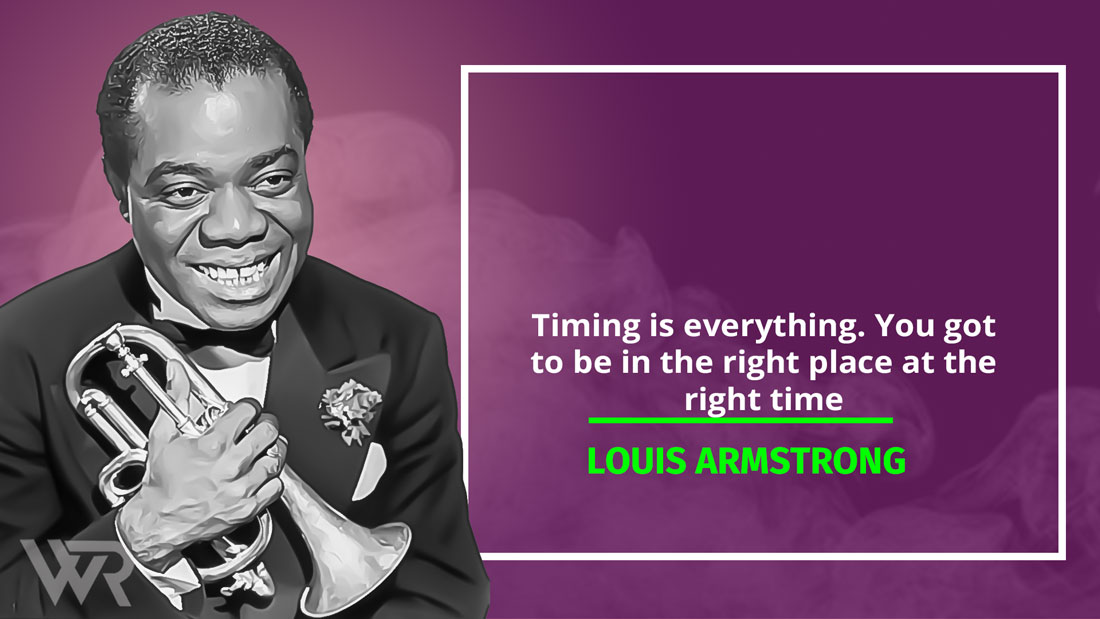
“Timing is everything. You got to be in the right place at the right time.” – Louis Armstrong
In this quote, Armstrong highlights the importance of timing, both in music and in life. Good timing, like being at the right place at the right time, can make a significant difference in outcomes.
This insight is particularly relevant in jazz, where timing and rhythm are crucial, but also applies broadly to life’s opportunities and successes.
“I’m here in the cause of happiness. I spread cheer wherever I go.” – Louis Armstrong
This quote reveals Armstrong’s understanding of his role as more than just a musician but as a bringer of joy and positivity. He saw his music and presence as a means to uplift spirits and spread happiness, which was a significant part of his legacy.
Armstrong’s words reflect a deep commitment to using his talents for the greater good, infusing joy and cheer into the lives of others.
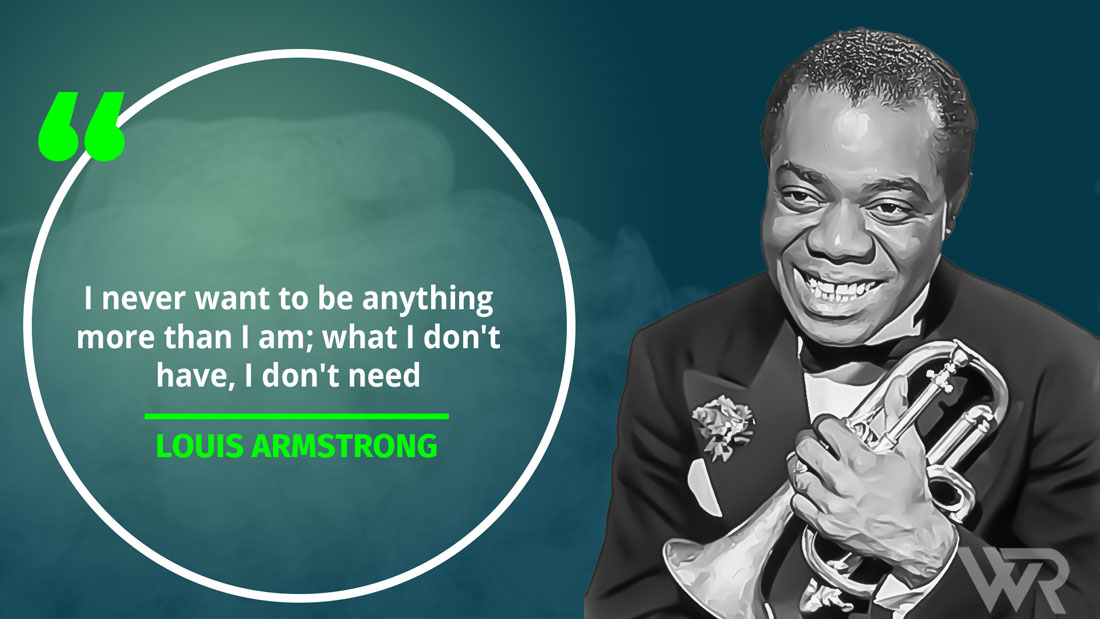
“I never want to be anything more than I am; what I don’t have, I don’t need.” – Louis Armstrong
Louis Armstrong’s humble outlook on life is beautifully captured in this quote. He expresses contentment with his identity and achievements, showing a deep sense of self-acceptance and gratitude.
This perspective is a refreshing contrast to the endless pursuit of more that often characterizes modern life. Armstrong’s words remind us of the importance of appreciating who we are and what we have, rather than constantly striving for what we lack.
“We have to live today by what truth we can get today and be ready tomorrow to call it falsehood.” – Louis Armstrong
In this quote, Armstrong reflects on the fluid nature of truth and the importance of living in the present. His perspective acknowledges that what is considered true today may change tomorrow, emphasizing the need for adaptability and open-mindedness.
Armstrong’s words encourage us to embrace the present while being prepared for the future’s uncertainties.
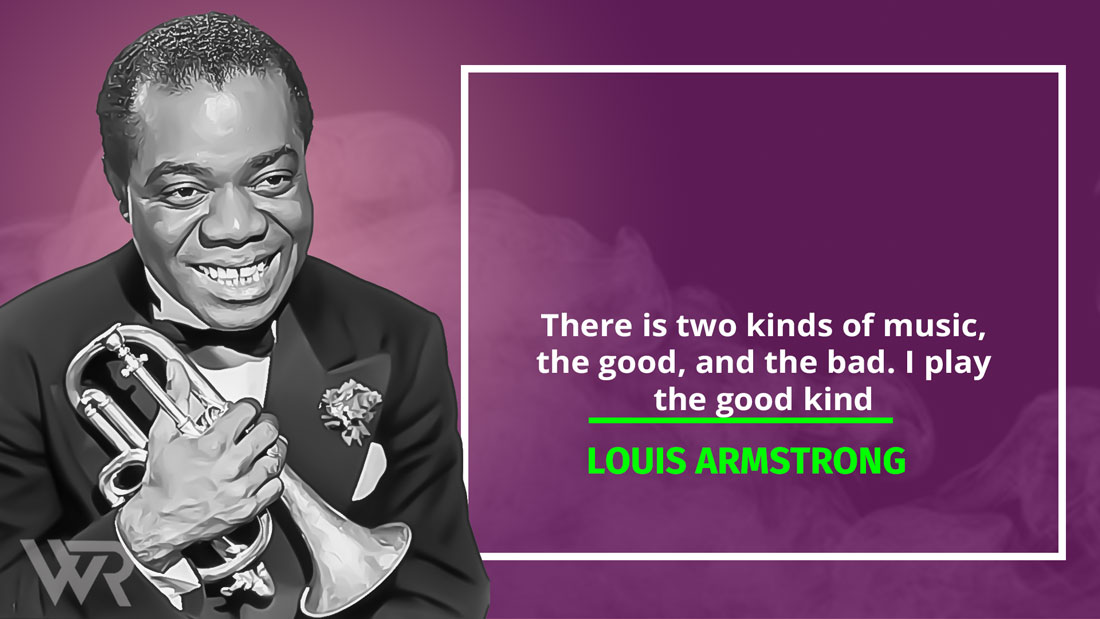
“There is two kinds of music, the good, and the bad. I play the good kind.” – Louis Armstrong
Armstrong’s simplistic dichotomy of music into ‘good’ and ‘bad’ reflects his straightforward approach to art.
He emphasizes the importance of quality and authenticity in music, suggesting that these factors are more significant than genre or complexity. This quote highlights his commitment to producing music that resonates with emotional truth and artistic integrity.
“Music is life itself.” – Louis Armstrong
This quote encapsulates Armstrong’s view of music as an essential component of existence. He saw music as a reflection of life, imbued with the same rhythms, emotions, and complexities.
Armstrong’s perspective positions music not as a mere backdrop to life but as an integral part of the human experience, capable of capturing and expressing the nuances of our existence.
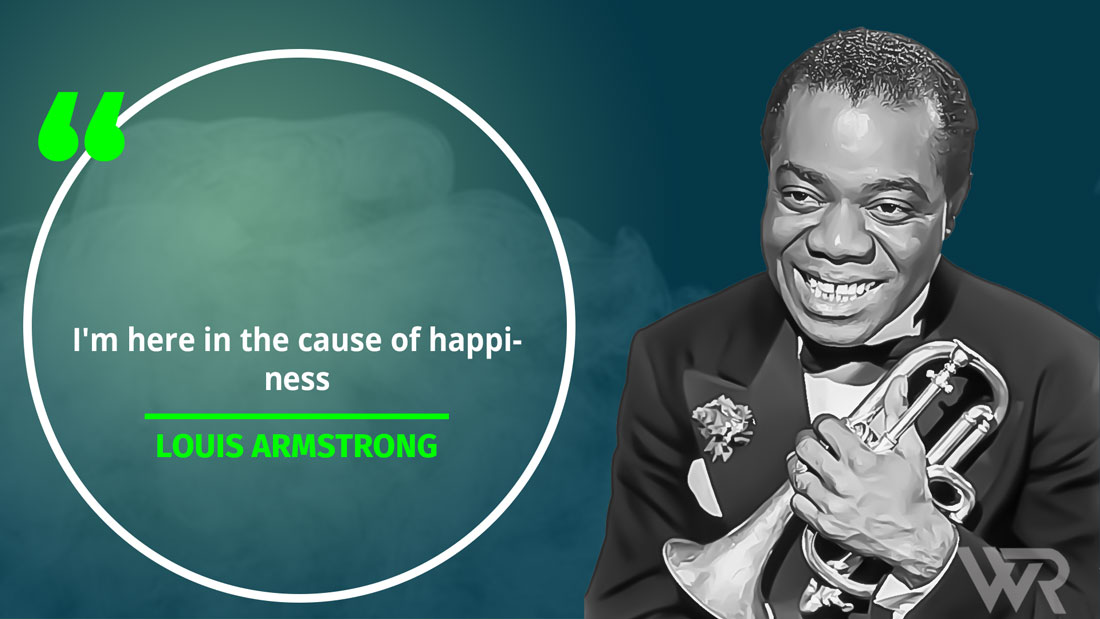
“I’m here in the cause of happiness.” – Louis Armstrong
Armstrong’s mission in life went beyond music; he aimed to spread joy and positivity. This quote reflects his understanding of the power of music to uplift spirits and bring happiness.
His commitment to using his talent for the greater good is an inspiring reminder of the role artists can play in enhancing the lives of others.
“The memory of things gone is important to a jazz musician.” – Louis Armstrong
Armstrong highlights the significance of memory and history in jazz music. He acknowledges that a musician’s past experiences, influences, and the genre’s history play a crucial role in shaping their musical expression.
This quote underlines the importance of remembering and honoring one’s roots and the legacy of those who came before.
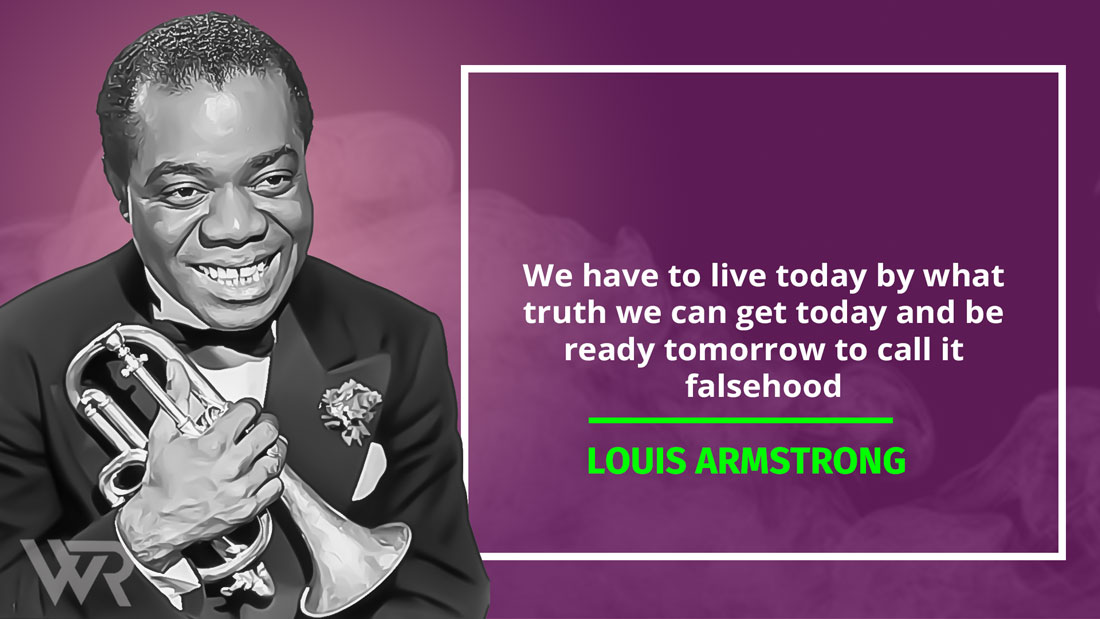
“We have to live today by what truth we can get today and be ready tomorrow to call it falsehood.” – Louis Armstrong
Armstrong’s words reflect the fluid nature of truth and the importance of living in the present. He suggests that truths are temporal and subject to change, thus advocating for adaptability and open-mindedness.
This perspective encourages us to embrace the present while being prepared for the evolving nature of life and knowledge.
Also Read: Lauryn Hill Quotes (with Commentary)
Final Thought
Louis Armstrong encapsulates the essence of a man who was much more than a legendary jazz musician; he was a philosopher of life whose words continue to inspire and resonate. Armstrong’s insights, drawn from a life full of both hardship and triumph, reflect a deep understanding of humanity, art, and the beauty of existence.
His profound yet accessible observations offer timeless wisdom, highlighting the importance of authenticity, resilience, joy, and the transformative power of music. Armstrong’s legacy, therefore, is not only etched in the annals of music history but also in the hearts and minds of those who find guidance and inspiration in his enduring words.

